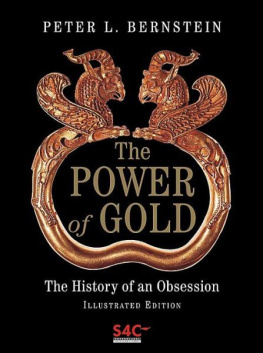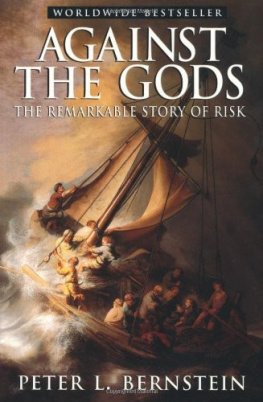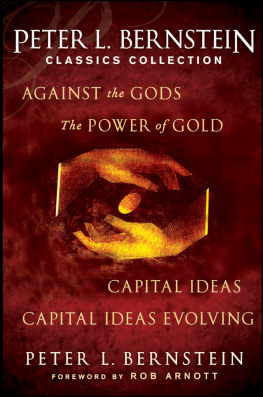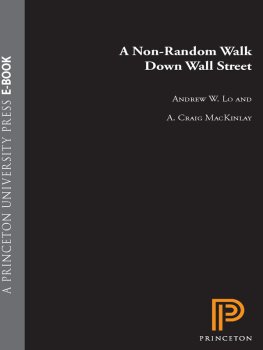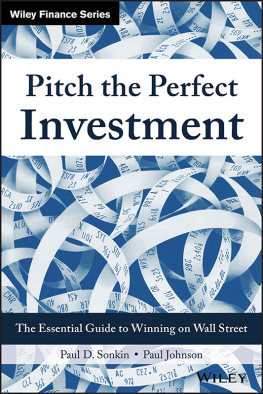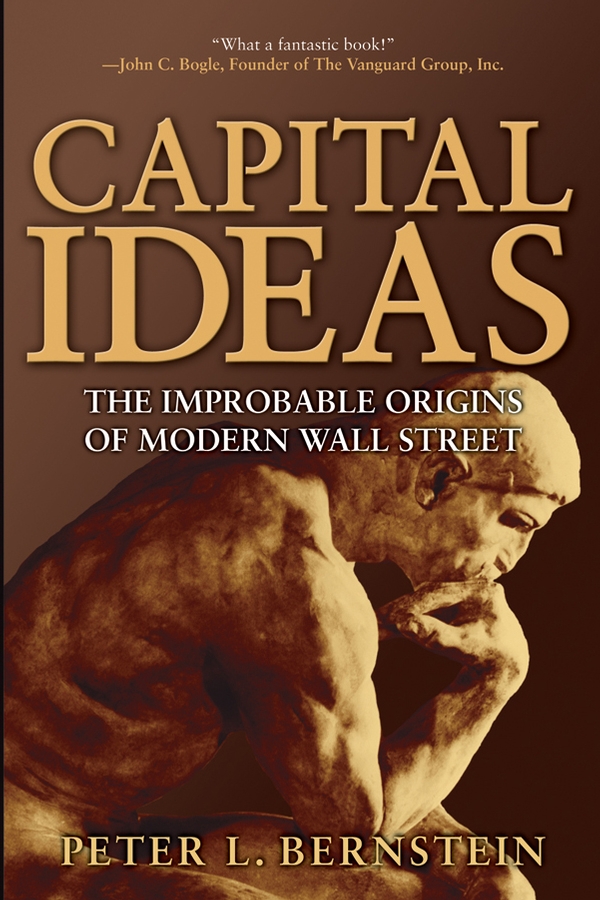Contents

Copyright 2005 by Peter 1. Bernstein. All rights reserved.
Published by John Wiley & Sons, Inc., Hoboken, New Jersey. Published simultaneously in Canada.
No part of this publication may be reproduced, stored in a retrieval system, or transmitted in any form or by any means, electronic, mechanical, photocopying, recording, scanning, or otherwise, except as permitted under Section 107 or 108 of the 1976 United States Copyright Act, without either the prior written permission of the Publisher, or authorization through payment of the appropriate per-copy fee to the Copyright Clearance Center, Inc., 222 Rosewood Drive, Danvers, MA 10923, (978) 7508400, fax (978) 7504470, or on the web at www.copyright.com . Requests to the Publisher for permission should be addressed to the Permissions Department, John Wiley & Sons, Inc., 111 River Street. Hoboken, NJ 07030, (201) 7486011, fax (201) 7486008, or online at http://www.wiley.com/go/permissions .
Limit of Liability/Disclaimer of Warranty: While the publisher and author have used their best efforts in preparing this book, they make no representations or warranties with respect to the accuracy or completeness of the contents of this book and specifically disclaim any implied warranties of merchantability or fitness for a particular purpose. No warranty may be created or extended by sales representatives or written sales materials. The advice and strategies contained herein may not be suitable for your situation. You should consult with a professional where appropriate. Neither the publisher nor author shall be liable for any loss of profit or any other commercial damages, including but not limited to special, incidental, consequential, or other damages.
For general information on our other products and services or for technical support, please contact our Customer Care Department within the United States at (800) 7622974, outside the United States at (317) 5723993 or fax (317) 5724002.
Wiley also publishes its books in a variety of electronic formats. Some content that appears in print may not be available in electronic books. For more information about Wiley products, visit our web site at www.wiley.com .
ISBN-13 978-0-47173174-0
ISBN-10 0-47173174-9
For Barbara
What is history all about if not the exquisite delight of knowing the details and not only the abstract patterns ?
Stephen Jay Gould
Acknowledgments
All authors who undertake projects like this need help from others. I have been unusually fortunate in having had such generous and essential assistance from the people named below.
The book could never have taken shape without the participation of the people whose work it describes: Fischer Black, Eugene Fama, William Fouse, Hayne Leland, Harry Markowitz, John McQuown, Robert C. Merton, Merton Miller, Franco Modigliani, Barr Rosenberg, Mark Rubinstein, Paul Samuelson, Myron Scholes, William Sharpe, James Tobin, Jack Treynor, and James Vertin. Each of them spent long periods of time with me in interviews, and most of them engaged in voluminous correspondence and telephone conversations as well. All of them read drafts of the chapters in which their work is discussed and gave me important criticisms and suggestions that enrich virtually every page of the book. Most of them also provided their photographs.
Each in his own way contributed to my understanding of the subject matter well beyond the chapters that were their immediate concern. In this regard, I hope I may be forgiven if I single out Paul Samuelson, my friend of more than fifty years. He served uncomplainingly as my mentor, inspiration, and inexhaustible research associate from the very beginning; the accumulation of handwritten wisdom that passed from his fax to my fax is a treasure in itself. And my thanks as well to Janice Murray, who made our communication so easy and rewarding.
I have also benefited from those who were kind enough to undertake the onerous task of reading the complete manuscript. Michael Granito, Bernard Obletz, Roger Kennedy, Patricia Carry Stewart, and Byron Wien were especially helpful in providing me with many suggestions, which I have made every effort to put to good use. Richard Brealeys bounteous contribution to both the theoretical and the historical aspects of the story was invaluable. Robert Heilbroner, my oldest friend and sometime co-author, combined painstaking editorial advice with broad critical observations whose influence is apparent throughout.
I am deeply indebted to Peter Brodsky, Michael Keran, William Lee, and Lawrence Seltzer, whose encouragement after their careful reading of early drafts gave me the impetus to carry on when the going was hardest.
Many other people helped in supplying or guiding me to research material without which the project would have run into sand early in the game. I am especially grateful to John Brush, Richard Cowles, Charles DAmbrosio, David Durand, Charles Ellis, Martin Fridson, Charles Henry, Judith Kimball, the staff of the Marlboro College Library in Marlboro, VT, Donald McCloskey, Joseph Murphy, M. F. M. Osborne, Earle Partridge, Edward Renshaw, Andrew Roy, Richard Russell, Hugh Weed, and Richard West.
I owe a special debt to Martin Leibowitz. The orginal plan of the book included a long section on the bond market, where Leibowitz has been the acknowledged leader as both theoretician and practitioner. When considerations of space and format led me to restrict the subject matter to the equity markets, I was unable to use the help that he had so generously provided. I hope to make up for that omission on an early occasion.
I have had enough experience as both writer and editor to know an editors editor when I meet one. Peter Dougherty is it. His participation in this endeavor was my great good fortune. He enlarged the scope of the book beyond my own more limited concepts. He sharpened its literary quality even as he deepened the quality of the content. Without his understanding of the subject and knowledge of the personalities, I would all too frequently have ended up in the wilderness. I have never known a more merciless taskmaster who could at the same time make the job great fun.
The convention on these occasions is for the author to describe his or her spouse as a nonentity whose main contribution is to keep the author isolated from the clutter of daily life. The good spouse arranges matters so that the authors wondrous flights of creativity can soar to heights reserved only to those human beings blessed by such a self-effacing lifes companion.
When I acknowledge that my Barbara performed to perfection the dreary job of isolating me from the clutter of daily life, I only hint at her contribution. She provided light when there was dark and brought me back to reality when I succumbed to euphoria. But even that was not all. Her most valuable gift was to be in the foreground rather than the background. She has been a close collaborator in every phase of the project, from the interviews to the planning and writing of each chapter. Every part of the book has been improved by her participation.
Even with all this help and support, I am certain that flaws remain. They comprise the only part of the book that is my responsibility alone.
Introduction: The Revolution in the Wealth of Nations
... the machine-gun clatter of fingers on a keyboard .
Americans have always welcomed change. Revolution is our birthright. We take it as a sign of our youth that we prefer the new to the old. We are fascinated by innovation and lionize the innovators. We are partial to tinkerers and make folk-heroes out of people like Thomas Edison, Henry Ford, and Benjamin Franklin.


